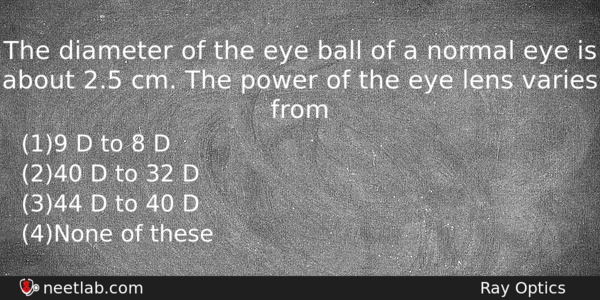| ⇦ | 
| ⇨ |
The diameter of the eye ball of a normal eye is about 2.5 cm. The power of the eye lens varies from
Options
(a) 9 D to 8 D
(b) 40 D to 32 D
(c) 44 D to 40 D
(d) None of these
Correct Answer:
44 D to 40 D
Explanation:
An eye see distant objects with full relaxation.
So, [1 / (2.5 × 10⁻²)] – [1 / -∞] = 1 / f or, P = 1 / f = 1 / 2.5 × 10⁻² = 40 D
An eye see an object at 25 cm with strain [1 / (2.5 × 10⁻²)] – [1 / 2.5 × 10⁻²] = 1 / f
.·. P = 1 / f = 40 + 4 = 44 D
Related Questions: - The amplitude of S.H.M. y=2 (sin 5πt+√2 cos 5πt) is
- If a proton, a deuteron and an alpha particle, on being accelerated by the same
- A particle is moving such that its position coordinates (x,y) are (2 m,3 m) at time
- A neutron moving with velocity v collides with a stationary particle
- A bomb of mass 16 kg at rest explodes into two pieces of masses of 4 kg and 12 kg.
Topics: Ray Optics
(94)
Subject: Physics
(2479)
Important MCQs Based on Medical Entrance Examinations To Improve Your NEET Score
- The amplitude of S.H.M. y=2 (sin 5πt+√2 cos 5πt) is
- If a proton, a deuteron and an alpha particle, on being accelerated by the same
- A particle is moving such that its position coordinates (x,y) are (2 m,3 m) at time
- A neutron moving with velocity v collides with a stationary particle
- A bomb of mass 16 kg at rest explodes into two pieces of masses of 4 kg and 12 kg.
Topics: Ray Optics (94)
Subject: Physics (2479)
Important MCQs Based on Medical Entrance Examinations To Improve Your NEET Score
18000+ students are using NEETLab to improve their score. What about you?
Solve Previous Year MCQs, Mock Tests, Topicwise Practice Tests, Identify Weak Topics, Formula Flash cards and much more is available in NEETLab Android App to improve your NEET score.
Share this page with your friends

Leave a Reply